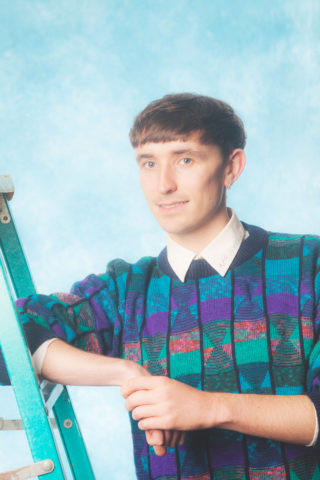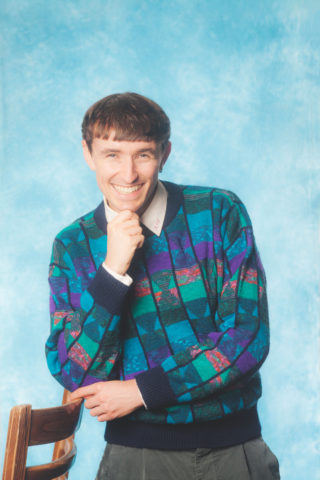Ross From Friends: Just a normal guy in his twenties making off the wall house music named after one of the most popular sitcom characters of all time
"Sometimes nobody dances and that’s cool, that makes sense to me"

"Sometimes nobody dances and that’s cool, that makes sense to me"
Ross from Friends has found himself as the breakout star in a generation of ironically-named house producers. Alongside the likes of DJ Boring, DJ Seinfeld and, to a lesser extent, DJ Bus Replacement Service, he’s brought a nostalgic, light-hearted approach to the fore of the genre. Taking his cues from classic house music, Ross From Friends – real name Felix Weatherall – has found a warmth and depth of emotion that’s often lacking from contemporary club music. Inspired as much by his dad’s time in clubs as his own, Weatherall’s music harks back to an imagined golden era, paying tribute to the genre’s roots but playing around with them at the same time.
Made either in his bedroom or his box studio in Bermondsey, which he shares with his live saxophonist and keyboard player, Weatherall’s music has led him on a journey few could have imagined when his understated anthem ‘Talk to Me (You’ll Understand)’ blew up in 2015. Both praised as an emotional triumph over an increasingly glossy world of dance music and derided as an unserious, not-for-the-club slice of revisionism (a feeling that photos like this one are so clearly designed to exacerbate), the track split opinions on forums and among friends. Depending on which side of the argument you came down on, Ross From Friends was either the hero of a new online underground or an imposter, milking club aesthetics without having paid his dues, an endless stream of canned laughter following him wherever he went.
Three years, two EPs and no shortage of transcendent, low-key bangers later, Weatherall is sat in the headquarters of Ninja Tune, the parent label to Flying Lotus’ Brainfeeder Records, which will release his debut album, ‘Family Portrait’, at the end of July. It’s an ambitious record – one shaped as much by his dad and their shared love of Hi-NRG and Italo disco as his live shows, which feature live guitar and saxophone.
In that time the debate around his position as the harbinger of the house music apocalypse or the second coming of lo-fi Christ has settled down – in recent months he’s played everywhere from Primavera to Berghain’s Panorama Bar. Looking back, the humour and lo-fi sensibility that split opinion at the time seem ahead of their time: a pre-cursor to the bedroom aesthetics that dominate in 2018. Settled into his role as just-a-normal-guy-in-his-twenties-trying-to-make-off-the-wall-house-music-under-the-name-of-one-of-the-most-popular-sit-com-characters-of-all-time, Ross From Friends is starting to be heard on his own terms.
Your new album is called ‘Family Portrait’ – who are your musical family?
I reckon my actual dad is part of my musical family. He’s massively influential for the whole record and everything I do. He’s a musician as well – well, I say musician, he used to DJ back in the day. He made all of this Hi-NRG dance music, did all sorts, squat parties, that kind of thing, so he’s my music dad. My music mum, in terms of the record, is maybe Kate Bush. Her attitude towards everything is amazing and listening to her music covers so many things for me. ‘Hounds of Love’ – that album is outrageously inspiring to me. It’s so, so funny and profound and ticks all the right boxes.
Has your dad heard the album?
He hasn’t heard it all; I just haven’t got around to sending it to him. It’s always like an awkward thing to show him my records; he’s a big part of it, so it’s hard to tell him that sometimes. It’s like, ‘go on, react like I want you to react’. When I’ve shown him my music before you can just read him straight away, he’s so transparent. If he genuinely likes it he’ll be grooving down to it, and if he doesn’t he just disengages, and you just see him drifting away or something.
Something that’s talked about a lot in your music is emotion – the main feeling I got from the new record is a kind of nostalgia. I was going to ask where that comes from but it sounds like it’s from that time with your dad, right?
Yeah, it’s definitely nostalgic, and I definitely have the emotional connection to the past, to being a kid. It’s reinvented it for me, listening to it all again. It’s that feeling, ‘have I heard it before, or haven’t I?’ – that feeling of my past, of my childhood – that I wanted to get across in some way with the album.
What do you think of British club culture at the moment?
I don’t know, to be honest. It doesn’t feel like an underground subculture really; even small artists are commercialised in a way. From my experience with a lot of underground clubbing it doesn’t feel like there’s a scene. I’m probably just not a part of it, but I haven’t experienced that.


So now you’re playing music that’s born from the Internet in clubs, how do you translate your music into that space?
That’s a weird thing with this album. Because it’s all over the place, because a lot of isn’t club music, a lot of it is difficult to play in the club, but I’m playing in a band with a guitar and a saxophonist in a nightclub. I think as long as it references dance music then it makes sense in a club.
One of your shows that stood out to me was Panorama Bar because it’s a place associated with a particular kind of dance music – what was that gig like for you?
That was a pretty striking thing. You could see the crowd splitting the moment we got on stage; there was a significant shift. They saw the saxophone and ran. We opened with some slow number and people who weren’t there to see us left pretty quickly, and just fans stayed, maybe other people stayed and enjoyed it, but you could physically see the crowd spreading, it was amazing.
Did the people that stayed dance? Do you even want people to dance?
People can do what they want. I never expect people to dance, to be honest. Sometimes nobody dances and that’s cool, that makes sense to me, and sometimes everybody is going crazy, and that makes no sense to me.
Your new album in on Brainfeeder – have you met Flying Lotus?
Yeah, once. It was in the green room at Phonox. He was DJing at an afterparty, and he turned up in the green room, which is a tiny little white box. He had a full crew in there – like Thundercat was there – and it was just me and my girlfriend. It was terrifying. FlyLo was really bigging me up in front of everyone. It was mad.
One final thing I need to know – how did ‘Thank God I’m a Lizard’ end up with that title?
This is me just obsessing over tracks, but there was a tambourine line looping, and I was changing the EQ on it for hours. It sounds like I’m losing my mind at this point; I probably was. It was looping for hours, and this tambourine started to sound like it was saying “thank god I’m a lizard”, and I couldn’t get it out of my head. So, I recorded myself saying it in the same rhythm as I could hear it and I layered it all over the track, so I decided to call it that as well. I’m worried there’s going to be Illuminati connotations, especially as we’ve designed this new logo that looks a bit like a pyramid with an eye, but maybe I should push that whole thing.
Photo by: Fabrice Bourgelle